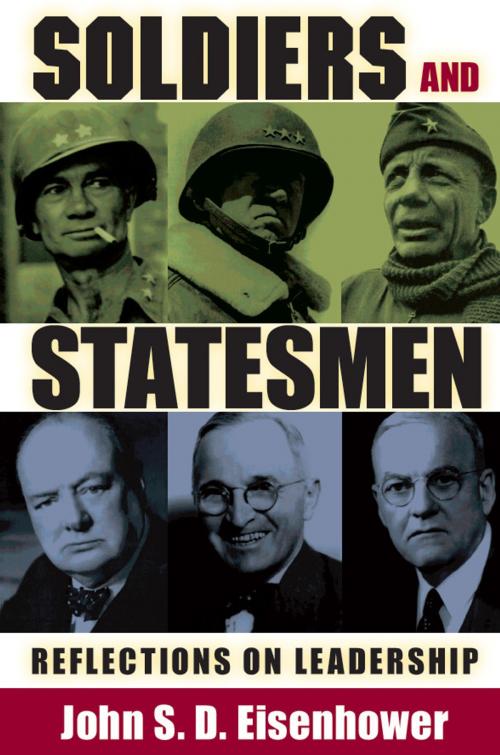Soldiers and Statesmen
Reflections on Leadership
Nonfiction, History, Military, Americas, United States, Biography & Memoir| Author: | John S. D. Eisenhower | ISBN: | 9780826272713 |
| Publisher: | University of Missouri Press | Publication: | April 1, 2012 |
| Imprint: | University of Missouri | Language: | English |
| Author: | John S. D. Eisenhower |
| ISBN: | 9780826272713 |
| Publisher: | University of Missouri Press |
| Publication: | April 1, 2012 |
| Imprint: | University of Missouri |
| Language: | English |
Which generals were most influential in World War II? Did Winston Churchill really see himself as culturally "half American"? What really caused the break between Harry S. Truman and Dwight Eisenhower? In Soldiers and Statesmen, John S. D. Eisenhower answers these questions and more, offering his personal reflections on great leaders of our time.
The son of President Dwight D. Eisenhower, John S. D. Eisenhower possesses an expert perspective on prominent political and military leaders, giving readers a matchless view on relationships between powerful figures and the president. Eisenhower also had a long military career, coincidentally beginning with his graduation from West Point on D-Day. His unique position as a young Army staff officer and close relationship with his father gave him insider's access to leaders such as Winston Churchill, Harry Truman, George Patton, Douglas MacArthur, Omar Bradley, John Foster Dulles, Mark Clark, Terry Allen, and Matthew Ridgway. He combines personal insight with the specialized knowledge of a veteran soldier and accomplished historian to communicate exclusive perspectives on U. S. foreign relations and leadership.
Eisenhower's observations of various wartime leaders began in June 1944, just after the Allied landings in Normandy. On orders from General George C. Marshall, Army chief of staff, Eisenhower sailed from New York aboard the British-liner-turned-American-troopship Queen Maryto join his father, Supreme Commander of the Allied Expeditionary Force, in London, where he stayed for over two weeks. A year later, at the end of the war, Eisenhower accompanied his father as a temporary aide on trips where Ike's former associates were present. In the mid-1950s, Eisenhower's perspective was broadened by his service in a room next to the White House Oval Office during his father's tenure as president.
On the light side, Eisenhower has added a special appendix called "Home Movies," in which he reveals amusing and often irreverent vignettes from his life in military service. Eisenhower gives readers both a taste of history from the inside and a rich and relatable memoir filled with compelling remembrances.
Which generals were most influential in World War II? Did Winston Churchill really see himself as culturally "half American"? What really caused the break between Harry S. Truman and Dwight Eisenhower? In Soldiers and Statesmen, John S. D. Eisenhower answers these questions and more, offering his personal reflections on great leaders of our time.
The son of President Dwight D. Eisenhower, John S. D. Eisenhower possesses an expert perspective on prominent political and military leaders, giving readers a matchless view on relationships between powerful figures and the president. Eisenhower also had a long military career, coincidentally beginning with his graduation from West Point on D-Day. His unique position as a young Army staff officer and close relationship with his father gave him insider's access to leaders such as Winston Churchill, Harry Truman, George Patton, Douglas MacArthur, Omar Bradley, John Foster Dulles, Mark Clark, Terry Allen, and Matthew Ridgway. He combines personal insight with the specialized knowledge of a veteran soldier and accomplished historian to communicate exclusive perspectives on U. S. foreign relations and leadership.
Eisenhower's observations of various wartime leaders began in June 1944, just after the Allied landings in Normandy. On orders from General George C. Marshall, Army chief of staff, Eisenhower sailed from New York aboard the British-liner-turned-American-troopship Queen Maryto join his father, Supreme Commander of the Allied Expeditionary Force, in London, where he stayed for over two weeks. A year later, at the end of the war, Eisenhower accompanied his father as a temporary aide on trips where Ike's former associates were present. In the mid-1950s, Eisenhower's perspective was broadened by his service in a room next to the White House Oval Office during his father's tenure as president.
On the light side, Eisenhower has added a special appendix called "Home Movies," in which he reveals amusing and often irreverent vignettes from his life in military service. Eisenhower gives readers both a taste of history from the inside and a rich and relatable memoir filled with compelling remembrances.















